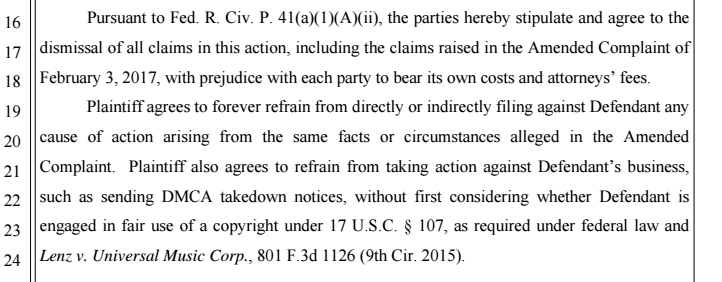Yesterday, a court dismissed game developer Digital Homicide’s $US10 million ($13 million) case against YouTube critic Jim Sterling. Fortunately for those of us who write about video games, Sterling’s scathing critique of Digital Homicide’s game Slaughtering Grounds won’t create precedent for developers slamming critics with million-dollar lawsuits.
Jim Sterling
“I’d say this should at least serve as a warning to developers that such extreme measures might sound good as threats, but are generally just a bad idea,” Sterling said in an email. “Critics, too, should take note — yes this case was frivolous, but it still had to be taken seriously once it was served.”
Years ago, Sterling published a YouTube video describing Digital Homicide’s Slaughtering Grounds as a “New ‘Worst Game Of 2014’ Contender”. Sterling, who regularly plays games he considers hilariously bad, skewered Slaughtering Grounds, deeming it an “absolute failure”. His critique implied Digital Homicide was selling an original game composed of unoriginal materials, or “asset flipping”. In response, Digital Homicide accused Sterling of playing the game incorrectly, perhaps to entertain or attract viewers. They soon filed a DMCA takedown to wipe Sterling’s video from YouTube.
“We find the usage of the terms ‘WORST GAME OF 2014 CONTENDER!’ and ‘Absolute Failure’ to describe the entirety of our product while not actually evaluating it in its entirety unfair and unreasonable use of our copyright material,” they wrote. YouTube briefly removed the video, but reinstated it after Sterling petitioned.
It could have ended there, but last March, the miffed developer filed a lawsuit accusing Sterling of “assault, libel, and slander” in Arizona District Court. On top of the $US10 million ($13 million) sum, Digital Homicide asked for “apologies in place of every offending article and video for a period of no less than 5 years”.
Now, this was a startling sight for games critics. If taken seriously, Digital Homicide’s lawsuit could constitute a threat against critics who publish negative reviews on large platforms. A little desperate, Digital Homicide later sued 100 mostly-anonymous Steam users for $US18 million ($23 million) in the wake of negative Steam comments. Steam subsequently removed Digital Homicide’s games from the platform, citing the company’s hostility to Steam customers.
Thankfully, Digital Homicide’s case didn’t make it very far. Sterling told me it was exactly the result he’d hoped for, although, after a year of this, he’s pretty tired.

via SidAlpha
What’s particularly disturbing about lawsuits like this is that, even in cases where they are clearly frivolous, as this was, they can force critics to spend significant amounts of money on legal defences. Sterling had to hire a lawyer, Bradley Hartman, who helped convince the court to dismiss this case, which, in Sterling’s words, involved “series of allegations that were difficult to comprehend even for the one accused of them”.
“Not all threats from the internet are idle ones, and I wouldn’t recommend anybody brush them off,” Sterling concluded.
[via SidAlpha]

Comments
11 responses to “Court Throws Out Digital Homicide’s Case Against Critic Jim Sterling”
Thank God 😉
Still can’t believe that DH thought this was a good use of their money. What a waste.
Romine was self-represented. He was only really wasting his time, which wasn’t that valuable, considering the quality of games produced by him to date…
I expect they got some brief increase in sales once this hit the news. I expect it wasnt enough to cover legal costs, and the following removal of all games from Steam would have really crimped the cashflow, but that was after the fact.
You’d think they’d try to save the money they scammed from their crappy games, given they’ll never make it as a game developer again.
Jim Fucking Sterling, Son!
That moniker is the only good thing produced by Digital Homicide.
Did Sterling actually have to pay for his defence against this bullshit? Or did the court award costs? You’d think he’d be able to get costs awarded in his favour given the clearly frivolous nature of the lawsuit?
The screen shot of the court record says both sides covered their own costs. It seems a lot less common for courts to award costs in the US compared to Australia.
Ah, the writing was too tiny for my elderly eyes to read on my phone 🙁
Oh well, hopefully it was pretty straightforward a case for his lawyer and hopefully not too expensive as a result. Relatively speaking, at least.
One of the other shitty things Digital Homicide did was to give money to Sterling’s Patreon as a way to prove he was “doing business” in their home state of Arizona. This in turn forced Sterling to defend an out of state law suit.
Yep no surprises there. Fair use of copyrighted material seemed pretty obviously to be the case, and for libel or slander to be actionable the defendant needs to be saying something that’s actually untrue, which was a long bow even given how spectacularly harsh Sterling’s critiques of DH were. Still, glad to see it over with for Sterling’s sake.